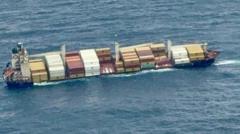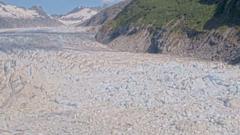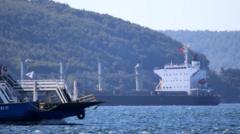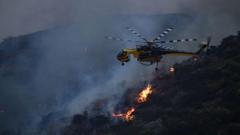The Indian state of Kerala has declared a state of alert following the sinking of a cargo ship that was transporting hazardous materials, leading to fears of an environmental disaster. The Liberian-flagged vessel capsized near Kochi in the Arabian Sea on Sunday, with officials confirming that an oil leak occurred as the ship sank.
The vessel, identified as MSC ELSA 3, had 24 crew members on board, all of whom were successfully rescued by Indian Navy personnel after an extensive operation. Reports indicate that the ship was carrying a total of 640 containers, 13 of which held hazardous materials, including calcium carbide - a chemical that, when in contact with seawater, produces a flammable gas. Furthermore, the ship contained significant quantities of diesel and furnace oil, adding to the complexity of the situation.
Environmental concerns are heightened due to the proximity of the incident to a highly biodiverse region that also serves as a key tourist destination. Local authorities are particularly worried about the impact of the oil slick, which could potentially stretch along the entire Kerala coast, threatening both human health and marine ecosystems.
In light of the unfolding situation, Kerala's chief minister's office has issued warnings, advising residents and fishermen to stay away from the affected areas and avoid contact with any containers or oil that could wash ashore. The Indian Coast Guard is taking immediate action, including deploying specialized ships and aircraft equipped for pollution control to manage the spill and monitor the area for any further risks.
Authorities are intensifying pollution containment efforts and are actively cooperating with maritime regulatory bodies to ensure both immediate and long-term safeguards for the coast and its ecosystems. With the event still developing, officials stress the importance of public awareness and environmental responsibility as they navigate the challenges posed by the capsized vessel and its hazardous cargo.
The vessel, identified as MSC ELSA 3, had 24 crew members on board, all of whom were successfully rescued by Indian Navy personnel after an extensive operation. Reports indicate that the ship was carrying a total of 640 containers, 13 of which held hazardous materials, including calcium carbide - a chemical that, when in contact with seawater, produces a flammable gas. Furthermore, the ship contained significant quantities of diesel and furnace oil, adding to the complexity of the situation.
Environmental concerns are heightened due to the proximity of the incident to a highly biodiverse region that also serves as a key tourist destination. Local authorities are particularly worried about the impact of the oil slick, which could potentially stretch along the entire Kerala coast, threatening both human health and marine ecosystems.
In light of the unfolding situation, Kerala's chief minister's office has issued warnings, advising residents and fishermen to stay away from the affected areas and avoid contact with any containers or oil that could wash ashore. The Indian Coast Guard is taking immediate action, including deploying specialized ships and aircraft equipped for pollution control to manage the spill and monitor the area for any further risks.
Authorities are intensifying pollution containment efforts and are actively cooperating with maritime regulatory bodies to ensure both immediate and long-term safeguards for the coast and its ecosystems. With the event still developing, officials stress the importance of public awareness and environmental responsibility as they navigate the challenges posed by the capsized vessel and its hazardous cargo.





















